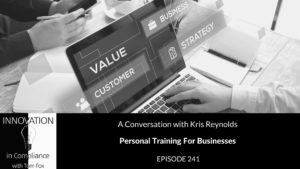
Kris Reynolds is the CEO of Arrowhead Consulting, a company that guides other organizations on managing their employees, processes, and tools. Tom Fox welcomes him to this week’s show to talk about corporate culture, strategies for post-pandemic productivity, and the future of project management.
</p>
Culture As a Focus
Corporate culture is important and must be aligned to the business’s core values. Your core values also can’t be simple slogans that you have up on walls. They have to be constantly acted on. “If you’re not really living and breathing the core values, you’re not really going to be a culture fit,” Kris tells Tom.
Post-Pandemic Strategies
Kris itemizes three strategies companies should be engaging within the post-pandemic business world: creativity, relationships and connections, and going back to basics. Creativity in advertising and marketing is key, and Kris also suggests pairing creativity with relationships. “I would encourage companies whether you’re small or large, to take the time to do more personal related touchpoints with the people that you’re trying to engage with,” he remarks. Going back to basics as a strategy is looking back at what got you to where you are as a business, and making sure that you’re accentuating those elements in your business.
Making Meetings More Efficient
Tom asks Kris to give some tips to make corporate meetings more efficient. The goal of meetings should be decision-making. Corporate meetings should be about making sure that the knowledge shared is being used to advance the respective initiative. Kris stresses having structured meeting agendas that are time-boxed and having the meetings begin with the most important topics. Having meetings commence like this enforces a sense of urgency and will encourage employees to arrive on time.
The Future of Project Management in Technology
Kris explains that there will be a greater focus on virtual reality training as opposed to Zoom meetings and PowerPoint presentations. This is because training in the future has to be experiential and hands-on. Training has to be engaging. “If we have some training spaces where we have the virtual reality, you could be training with somebody across the other side of the globe and being able to talk and work on projects together and things like that,” Kris tells Tom.
Resources
Kris Reynolds | LinkedIn | Twitter
Arrowhead Consulting






